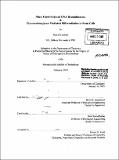| dc.contributor.advisor | Bevin P. Engelward and Ram Sasisekharan. | en_US |
| dc.contributor.author | Kiziltepe, Tanyel, 1976- | en_US |
| dc.contributor.other | Massachusetts Institute of Technology. Dept. of Chemistry. | en_US |
| dc.date.accessioned | 2006-03-24T18:29:55Z | |
| dc.date.available | 2006-03-24T18:29:55Z | |
| dc.date.issued | 2005 | en_US |
| dc.identifier.uri | http://hdl.handle.net/1721.1/30204 | |
| dc.description | Includes bibliographical references. | en_US |
| dc.description | Thesis (Ph. D.)--Massachusetts Institute of Technology, Dept. of Chemistry, 2005. | en_US |
| dc.description | "February 2005." Vita. | en_US |
| dc.description.abstract | (cont.) Such therapeutic approaches require an understanding of the mechanisms regulating stem cell differentiation. The second part of this thesis investigates the role of HSGAGs in embryonic stem cell differentiation into endothelial cells. Differentiation of stem cells was accompanied by increases in the transcript levels of key HSGAG-biosynthetic enzymes, and the quantity of cell surface HSGAGs. Differentiation into endothelial cells was inhibited by ablation of the HSGAG-biosynthetic machinery by chlorate treatment, or by the enzymatic degradation of the HSGAGs. Exogenous addition of heparin to chlorate-treated cells partially restored differentiation into endothelial cells. These effects were mirrored in phospho-ERK levels, suggesting the involvement of the MAPK pathway. These results suggest that stem cell differentiation can be regulated by modulating the HSGAG moiety and this opens up new treatment modalities for cancer therapy and regenerative medicine. | en_US |
| dc.description.abstract | The new paradigm is that cancers may originate from stem cells, and that terminal differentiation of stem cells is a possible treatment for cancers. Understanding the origin of cancers requires elucidation of factors causing genetic rearrangements. The first part of this thesis explores the effects of NO on homologous recombination in embryonic stem cells. Using terminal differentiation of stem cells as a therapy for cancer necessitates an understanding of factors governing their differentiation. The second part of this thesis explores the effects of heparan sulfate glycosaminoglycans (HSGAGs) on stem cell differentiation. Inflammation is increasingly recognized as an important risk factor for cancer. During inflammation, macrophages secrete NO, which reacts with superoxide or oxygen to produce ONOO⁻ or N₂O₃, respectively. Although ONOO⁻ and N₂O₃ are potent DNA damaging agents, little was known about the ability of these agents to induce homologous recombination in mammalian cells. Homologous recombination events are a significant source of mutations that are likely to contribute to initiation and progression of some cancers. In the first part of this thesis, the recombinogenic potential of ONOO⁻ and N₂O₃ was characterized by sister chromatid exchanges, chromosomal direct repeat substrate and interplasmid recombination assays. Our results show that on a per lesion basis, ONOO⁻ -induced oxidative base lesions and single strand breaks are more recombinogenic than N₂O₃-induced base deamination products. These results are in accordance with the model that ONOO⁻ -induced recombination may contribute to inflammation-induced cancer. Directed differentiation of stem cells holds an immense potential for regenerative medicine as well as cancer therapy. | en_US |
| dc.description.statementofresponsibility | by Tanyel Kiziltepe. | en_US |
| dc.format.extent | 190, [2] leaves | en_US |
| dc.format.extent | 10149227 bytes | |
| dc.format.extent | 10124519 bytes | |
| dc.format.mimetype | application/pdf | |
| dc.format.mimetype | application/pdf | |
| dc.language.iso | eng | en_US |
| dc.publisher | Massachusetts Institute of Technology | en_US |
| dc.rights | M.I.T. theses are protected by copyright. They may be viewed from this source for any purpose, but reproduction or distribution in any format is prohibited without written permission. See provided URL for inquiries about permission. | en_US |
| dc.rights.uri | http://dspace.mit.edu/handle/1721.1/7582 | |
| dc.subject | Chemistry. | en_US |
| dc.title | Nitric oxide-induced DNA recombination & glycosaminoglycan mediated differentiation in stem cells | en_US |
| dc.title.alternative | Glycosaminoglycan mediated differentiation in stem cells | en_US |
| dc.type | Thesis | en_US |
| dc.description.degree | Ph.D. | en_US |
| dc.contributor.department | Massachusetts Institute of Technology. Department of Chemistry | |
| dc.identifier.oclc | 60695782 | en_US |
